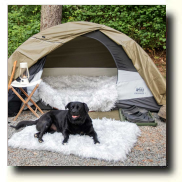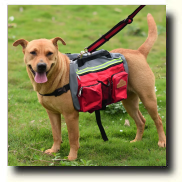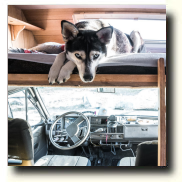It is much more common these days to see hikers and campers moving through the forests with their favorite furry companions.
But, be aware that pets and vacations don’t always go hand in hand. However, one of the reasons you got a dog in the first place was to have adventures together, right?

So the most important thing is be honest with yourself about your particular pup or pups. Will they be a good match for the camping world, or should they be left at home?
Why is camping with dogs is so much fun? The reasons to take your dog camping by far outweigh leaving them behind.
Yes, they can restrict your plans somewhat. But the enjoyment we get from them is multiplied when we’re out on an adventure together in the scenic Sierra National Forest.
- They are a great source of distraction from letting your mind drift back to ‘at home’ worries.
- They keep your kids entertained so you can snatch precious quiet time here and there.
- So long as they’ve had their exercise, they’re always good for afternoon nap time with you.
- They provide protection for you when you are camping in more wild locations.
- They draw you to other dog owners, making it easy to meet new people.
- They’re always keen to help collect wood for the fire.
- You’re guaranteed to get morning kisses – whether you like it or not!
- You’ll never miss a sunrise – being woken up by pawing at the tent zipper does have its benefits (honestly!).
- They’ll create moments to remember forever.

What sort of dog do you have? If you’ve never taken your furry friend camping, it’s worth considering if your dog is a ‘camping dog’ or not. Be honest. You don’t want to bother others.
Is your dog a yapper? No-one wants a dog barking at nothing for hours or long into the night. So if your hound has a tendency to vocalize their woes then set up your camp far away from other people.
Does your dog tend to be aggressive around other dogs?
If fiddo enjoys likes a bit of a scrap now and again, then make sure you keep it leashed AT ALL TIMES.
But, that will no stop other dogs approaching your dog to arrange for a sniff or two. Therefore, you might want to consider carrying a muzzle too.
Will your dog come back when you call him? If not, then again, you will need to keep your dog on a leash, both at camp and out and about.
Does your dog hate being on a leash? If this is the case, then wilderness camping, far from others, is the way forward for your and the beast. Pet friendly camping grounds need to have their rules and there will be strict regulations on free-roaming dogs.
What will you be doing on your camping trip? If you plan on spending your days sightseeing in towns or visiting tourist attractions, bringing your dog along probably won’t work. Leaving unattended dogs at a campground or in a hot vehicle for hours is a really bad and unhealthy idea.
Be prepared and plan ahead to choose a campsite that allows dogs. There might be extra costs and certain restrictions. Make sure your animals has an ID on them so it will be easy to identify. Add details of the campground and your mobile number to a temporary tag.

Locate a vet near to the campsite. The odds are that you won’t need to use it, but it’s good to know it’s there.
Apply a flea and tick preventative to your dog. Camp areas are prime locations to pick up unwanted parasites that are unpleasant for your dog.
Follow the rules of the campsite when camping with dogs. Put a large group of dogs in a field with families, tents, food, smells, fresh air and no rules, and all havoc would break loose.
Here are some good guidelines that apply to camping with a dog:
- Bag the poop and take it with you.
- Don’t let your dog adopt another family. They may look like they want him around, but he’ll think it’s OK to visit the whole campsite. Not everyone will be quite as welcoming.
- Having to shout at your dog constantly is not convenience to you or others. If you have a disobedient dog, then leave him, her or them home.
- Don’t ignore your dog if he won’t stop barking. It might be that you need to take him for a walk off site to quiet him down.
- Just because you know your dog is friendly, doesn’t mean other people will assume the same. So keep them on a leash when around other people or other dogs.
- Acclimate your dog to their new surroundings. Having been cooped up in the car for hours, they’ll be dying for a pee and ready to stretch their legs. So before you set up camp, give them a treat and take them for a walk. A stroll around the site will get them used to all the exciting new smells and sounds.
Story based upon information
provided by Cool of the Wild